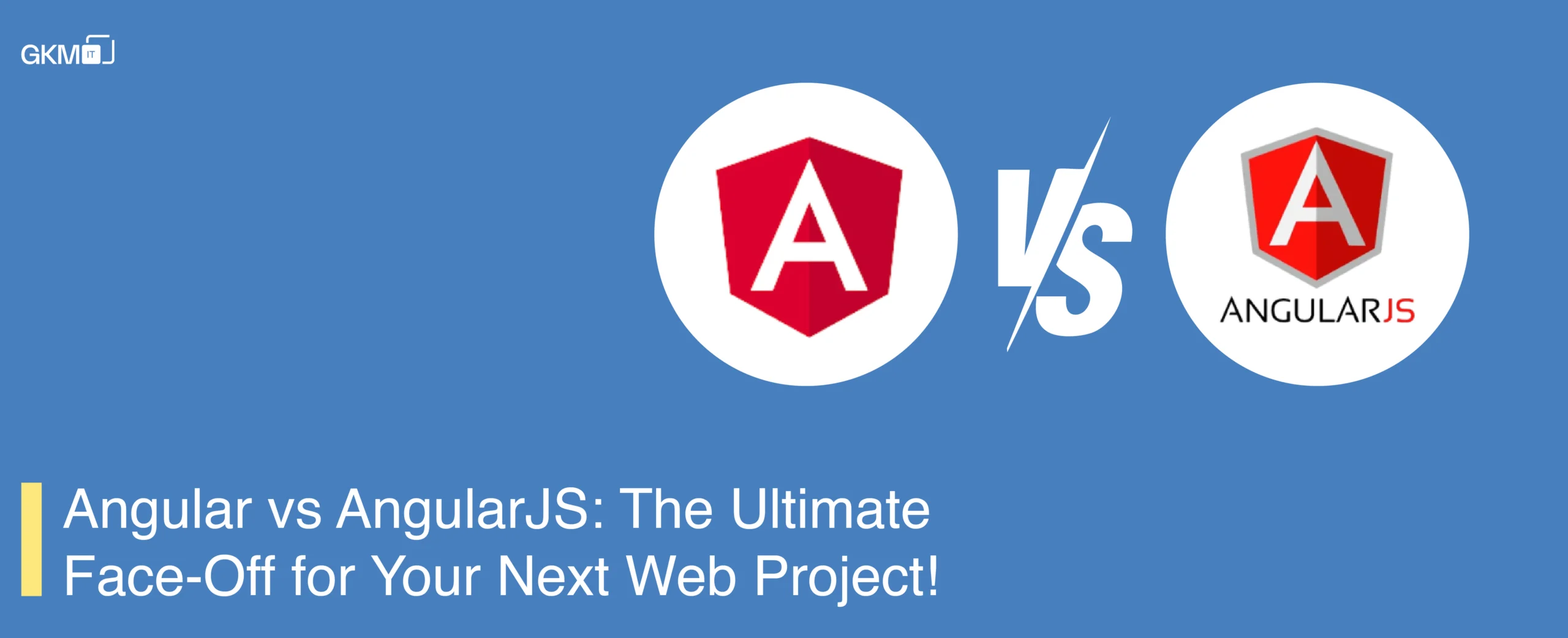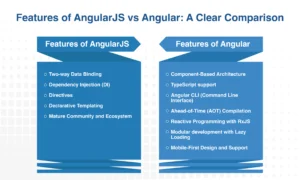
The Ultimate Face-Off Between Angular vs AngularJS for Your Next Project
Picture this scenario: you are at an event that features a horse race between two heavyweight frameworks – AngularJS, the way-finder, and Angular, the new kid on the block; both frameworks boast rapid development and user experience, but which one will secure the winning trophy for your new project?
If you have ever been curious about “Angular vs AngularJS – what’s the difference?” or questioned whether or not Angular CLI is worth it, you are in the right place. This blog will comprehensively explore the capabilities, advantages, and differences worth noting between Angular and AngularJS while answering some of the top FAQs so you can choose the best framework for your needs.
What are Angular and AngularJS?
Before the race starts, let’s meet the contenders.
AngularJS is the older sibling. Launched by Google in 2010, AngularJS is a JavaScript-based front-end framework that creates dynamic web applications. With its simple structure and easy integration capabilities, the AngularJS framework uses the classic MVC (model-view-controller) architecture and two-way data binding.
Angular (sometimes referred to as Angular 2+ or just Angular) is the next-gen framework released in 2016 as a new take on AngularJS. Built with TypeScript, it leads the charge in supporting component-based architecture and brings many modern web development concepts with it. Angular is serious about scalability, speed, and overall performance, making it the tool of choice for larger enterprise-level applications.
Features of AngularJS vs Angular: A Clear Comparison

Recognizing the most crucial traits of each framework, AngularJS and Angular, can be a big help in making a decision about which framework is a better fit for your project. Let’s examine in detail what made each framework distinctive and powerful in its own way.
Features of AngularJS
AngularJS, as the original JavaScript framework, establishes the framework for dynamic web applications. AngularJS’s primary characteristics are:
Two-way Data Binding
This feature allows for automatic synchronization of the data model to the view UI, which makes changes on the model instantly reflected on the view and vice versa, cuts down on boilerplate code, and reduces the overall development workload.
Dependency Injection (DI)
AngularJS’s built-in DI system takes care of the components and services your app needs to function and enables you to swap or replace implementations easily while keeping your code clean and modular, which makes testing and refactoring easy.
Directives
Directives give developers a way to expand HTML with custom elements and attributes, allowing the creation of dynamic, reusable UI components without the need to write complex JavaScript.
Declarative Templating
AngularJS incorporates regular HTML and enhanced HTML with Angular-specific syntax, resulting in easy-to-write and easy-to-read templates, allowing even novice developers to dream up interfaces.
Mature Community and Ecosystem
After years of stability, AngularJS has a massive repository of tutorials, plugins, and third-party integrations available, and consequently, it is easy for developers to get support and learn the plugins and techniques available to them globally.
Features of Angular
As the modern successor to AngularJS, Angular has been developed with the issues that early JavaScript frameworks presented. Angular offers powerful new features that enhance performance, scalability, and developer productivity:
Component-Based Architecture
Angular makes use of a modular system that builds applications as a tree of reusable, self-contained components. This creates a better structure for code organization and increased maintenance.
TypeScript support
With TypeScript as its foundation, Angular utilizes static typing, improved tool support, and modern ECMAScript capabilities to improve code quality, readability, and runtime error reduction.
Angular CLI (Command Line Interface)
While many tools assist with the development process, the Angular CLI is a powerful productivity tool to help you develop with efficiency by automating project scaffolding, developing a development server, testing, and building, simplifying the overall development process.
Ahead-of-Time (AOT) Compilation
Angular compiles your application’s templates during build time versus runtime, leading to faster rendering and faster application starts.
Reactive Programming with RxJS
Angular provides RxJS, a library for reactive programming, enabling you to effectively manage asynchronous data streams and event handling. Reactive programming is vital for applications that are responsive in real-time.
Modular development with Lazy Loading
Angular provides a modular development option with lazy loading; when lazy-loaded modules happen to be needed, they will load, otherwise, only the core applications will be downloaded at the time of load. So, lazy-loading allows your application to initially load quicker and consume the device’s resources more efficiently.
Mobile-First Design and Support
Angular has been built for mobile performance. Angular, being a JavaScript framework, utilizes responsive features and services, not only performs well but also optimizes rendering across devices for a solid design experience.
Why Do These Features Matter
The choice of whether to choose AngularJS or Angular will rely on the complexity of your project, the performance needs, and long-term goals. AngularJS is simple and easy to use and lends itself well to smaller projects or legacy applications. However, Angular is modern with many features, a wide variety of tooling, and performance optimization as needed when creating complex, scalable and high-performance web applications.
Knowing and understanding these features in detail means you can strategically/manage your development with a framework that works best for you. You can build useful applications that are “future-proof.”
Advantages of AngularJS vs Angular: Which Framework Brings More to the Table?

When it comes to choosing a web development framework, grasping the unique advantages each framework offers can really make a difference. AngularJS and Angular both come with their own set of strengths, tailored to meet various project needs and developer styles.
Whether you need a quick fix or a robust, scalable solution, understanding what each framework brings to the table will empower you to make a smart choice and boost your development efficiency. Let’s dive into what distinguishes AngularJS from Angular in terms of its benefits.g
Advantages of using AngularJS
Easier Learning Curve for Beginners, Familiar with JavaScript
AngularJS is built on plain JavaScript, which makes it a breeze for developers who are just starting out with modern frameworks. This means they can get up to speed quickly.
Quick Prototyping for Small to Medium Projects
Thanks to its straightforward nature, AngularJS allows for rapid development cycles, making it ideal for projects that need to launch quickly.
Simple Integration to Existing Web Applications
AngularJS can be introduced in phases into legacy applications without doing a complete rewrite so it is well suited for applications that will be incrementally upgraded.
Large Ecosystem of 3rd-Party Tools and Libraries
With years of community work, there is a rich ecosystem of extensions and plugins to enhance its capabilities.
Great for Projects That Don’t Need High Performance or Scalability
If you’re creating a simple app or internal tool, AngularJS can provide a simple and stable solution for your project.
Advantages of using Angular
Better Performance, Quick Rendering with Change Detection
With an optimized architecture, Angular can provide a better user experience while handling complex data changes.
Powerful Tooling Capability with Angular CLI for Automated Workflows
The CLI streamlines project setup, testing, and deployment, which frees up time for developers.
Improved Security Features and Ongoing Support from Google
Frequent updates and strong support from Google set Angular up for a secure and sustainable future.
Scalable Architecture for Complicated Apps at Large Scale
Angular’s flexible structure and lazy loading capabilities make it great for business applications.
Improved Developer Experience with TypeScript and Strong Typing
TypeScript’s integration assists in catching errors early and improves maintainability when working on larger codebases.
Rich Ecosystem with Official Angular Material UI Components
Prebuilt, customizable UI components help to speed up development and maintain design consistency.
Active and Growing Community, Continuously Improving
An active community offers more resources, updates, and a continuous stream of innovation for Angular.
Angular CLI: Your Developer’s Best Friend
If you’ve never had a chance to use Angular CLI, you are missing a huge productivity boost with a powerful developer’s toolkit.
Angular CLI is an acronym for Command Line Interface, a development tool that can:
- Fast project creation in Angular with good defaults.
- Generate components, services, modules, etc. in seconds with simple commands.
- Run development servers and create optimized production bundles.
- Run tests and manage pipeline deployments as easily as possible.
No more manual setup problems! The CLI takes care of configurations and scaffolding, so you can just add cool things.
Angular vs AngularJS: Performance Showdown
The performance will either make or break the user experience. So, how do Angular and AngularJS stack up?
- AngularJS depends on dirty checking for its two-way data binding, so as your application becomes increasingly complex, especially with many watchers in the Document Object Model (DOM), the speed will increase, and subsequent updating will slow down.
- Angular implements a better change detection strategy and uses Ahead-of-Time (AOT) compilation – compiling templates as part of the build process versus at runtime – delivers a more efficient load time and will lead to a faster resolving experience.
- Angular uses TypeScript and has tree shaking (eliminating unused code), which will produce much smaller bundles and a much faster startup.
- Angular allows for lazy loading. Only the necessary parts of your app get loaded initially; this can do tremendous things for performance if your application is large.
Simply put, Angular outperforms AngularJS by a significant margin, especially for large and dynamic applications.
Which Framework Should You Choose?
Your choice comes down to your project needs and team skills.
| Criteria | Choose AngularJS if… | Choose Angular if… |
| Project size | Small to medium, quick prototyping | Large-scale, complex, enterprise apps |
| Performance needs | Moderate, non-critical apps | High performance, scalability, and mobile support |
| Developer expertise | Familiar with JavaScript, new to TypeScript | Comfortable with TypeScript and modern tools |
| Long-term maintenance | Short-term, legacy projects | Long-term, actively maintained projects |
| Tooling and productivity | Simple tools, minimal CLI use | Modern CLI, testing, and build tools |
| Future-proofing | Legacy system support | Up-to-date framework with active support |
Conclusion: Angular vs AngularJS Analysis – The Decision
The Angular vs AngularJS frameworks conversation is not only about which is newer or faster, but which will be the best suited for the unique journey of their project.
AngularJS is like that old bomb-proof car: steady, reliable, obvious! But when you want a spirited, over-trained horse that has piles of excess designed for the future and beyond, Angular is clearly the “winner”.
Whether you are just starting out or are a seasoned pro, awareness of the possibilities and limitations of these frameworks will help you continue to build better, faster, and maintainable web apps no matter the journey you decide to take.
Are you ready to take the journey forward with Angular, or are you going to keep the legacy with AngularJS? It does not matter, you have a fine engine either way!
Related Blogs:
Frequently Asked Questions
1. What is the primary difference between Angular and AngularJS?
Angular and AngularJS differ primarily in architecture and language. AngularJS uses JavaScript (and an MVC structure), while Angular uses TypeScript (and a component architecture). Angular also comes with enhanced performance, support for mobile, and modern tooling like Angular CLI, which makes a difference for modern, large-scale web applications.
2. Which framework is better suited for modern web development?
Angular is better suited for modern web development because of support for TypeScript, Angular CLI, modular structure, and better performance. But unlike AngularJS, it allows for scalable architecture, lazy-loading, and mobile-first design – all requirements for today’s responsive, high-performance, enterprise applications.
3. What is Angular CLI, and how does it benefit developers?
Angular CLI is a command-line interface to help you scaffold, build, test, and deploy an affordably efficient Angular application. Additionally, it automates repetitive tasks, streamlines workflows, and implements best practices, allowing you to improve your productivity as a developer when you are working with the most modern Angular frameworks.
4. How do Angular and AngularJS compare in terms of performance?
Angular has advantages over AngularJS in terms of speed of rendering, faster (better) change detection, and Ahead-of-Time (AOT) compiling. Unlike AngularJS’s outdated digest cycles, Angular supports lazy loading and TypeScript-optimized code for better use in a complex application. Angular is the best option for interactive applications that are high-speed, capable of running on larger scales, for mobile, etc.
5. Which framework should I choose for my project?
Use AngularJS for lightweight applications or when working in legacy code. Use Angular if you need something more powerful and scalable, with the advanced features of Angular and strong tooling support (such as Angular CLI), and better performance. Use Angular frameworks for the long-term future.